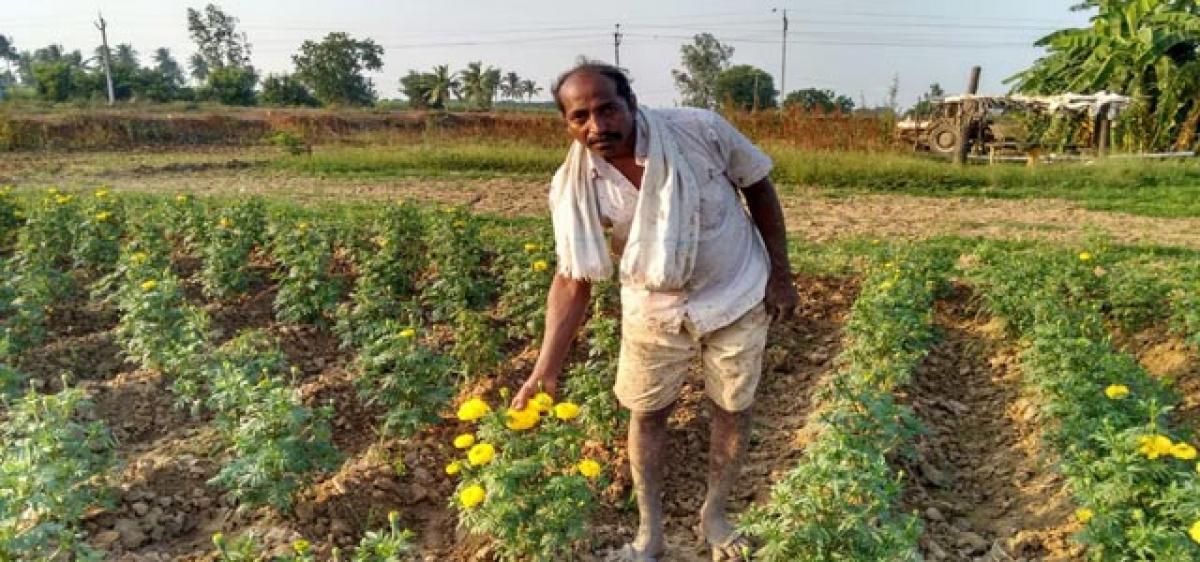Live
- Andhra student found dead at NIT Patna, police starts probe
- Hyderabad: Meet held on ‘green education’
- TGCHE announces DOST Intra College Phase-III
- Nagarkurnool MLA Dr. Rajesh Reddy Honored at 58th Orthodontic Conference
- HC junks petition challenging formation of mgt committees for two categories of temples
- Hyderabad: Water supply interruption in parts of city
- SCR to temporarily stop trains at Vikarabad stn
- SC takes cognisance of ‘objectionable’ comments of HC judge against woman lawyer
- Vetrimaaran responds to NTR’s proposal; says going to happen soon
- Rumorscleared: Salman Khan not involved in ‘Singham Again’
Just In

No rituals are celebrated without flowers but floriculture cultivation in the district was found to be a herculean job with no significant profits.
Nellore: No rituals are celebrated without flowers but floriculture cultivation in the district was found to be a herculean job with no significant profits. Though there are risks involved in cultivation, horticulture crops are being grown in the recent years due to huge demand for the produce. But, the farmers are in losses due to low price being offered by traders.
- Jasmine, Chrysanthemum, Marigold, Hibiscus and other crops are being grown in many parts of the district in small patches of agriculture lands
- Jasmine farming is getting costlier due to high cost of lease per annum
In fact, flowers are the best way to convey the feelings of our heart to the beloved ones and these have the capacity to turn the minds of individuals to pleasant one with their sweet fragrance. Flowers play a key role in every occasion and add beauty and life to the celebrations. In Nellore, farmers cultivate a variety of flowers like marigold (banthi), jasmine (malle), chrysanthemum (Chemanthi), Hibiscus (Mandara), and many others are grown in small extent of farms in various parts of dry lands and coastal places.
“Traders are giving Rs. 50 per kg for marigold during peak demand days in connection with important festivals and marriage season. Now, we get Rs. 10-15 per kilogram that is not even sufficient for our expenditure,” said Talapala Srinivasulu from Gummalladibba in Kovur mandal. He is cultivating marigold garden on 3 acres close to his village.
He added that they were incurring expenditure of Rs. 40,000-Rs. 50,000 per acre for fertilizer, pesticides and other labour related expenses. He said it would be bit profitable for the farmers if the price is Rs. 30-40 per kg. Most of the crop grown in the city surroundings are close to market area located in Atmakur bus complex. The marigold garden starts giving crop after 2 to 2.5 months and the flowers can be plucked for the next 2.5 to 3 months continuously.
In Nellore, a large chunk of land which is having irrigation sources is earmarked for rice and the growers refuse to stop the other traditional crops such as sugarcane and chilli. But they allocate small patches of land for cultivating horticulture crops in many villages as a customary practice. “Even though traders are getting huge profits they have been giving us very meagre price for the flower crops. Now, jasmine farmers are bit lucky that prices are comfortable at Rs. 250-300 per kg during off season,” added Srinivasulu. The jasmine crop season starts from January/February to October and for this crop which requires low moisture in the air.
Jasmine plantations are among the most preferred horticulture crops and these plantations are coming up close to the Penna River in many mandals subject to the convenience of the farmers. Jasmine is grown in Damaramadugu, Rebala, Duvvuru, Mudivarthi, Talamanchi, Gummalladibba and other places. High investment is needed for jasmine crop with the requiring farmers to invest Rs. 1.50 to 2 lakh and more per acre. In fact, jasmine farmers in Rebala area were paying Rs. 75,000 per acre as lease amount and the total expenditure comes to around Rs. 1.50 lakh and they get crop after two years only and continue up to 5-6 years.
Tribal farmers of Kesavaram in Kota mandal were also cultivating jasmine and they face difficulty for marketing. They move on a daily basis to Gudur, Kota and Vakadu for sale. Others who cannot bear regular expenditure sell at roadside giving signals to the commuters. “We grow jasmine and Gudur residents know about kesavaram jasmine. But, we are not getting good price that has been making us disgusted. We don’t have support from the government and other organizations,” said T Venkataiah from the village. ThoughFarmer Producer Organisations (FPOs) were being come up in many parts by some non-profit organizations yet they have to reach us, he added.
By P V Prasad

© 2024 Hyderabad Media House Limited/The Hans India. All rights reserved. Powered by hocalwire.com







